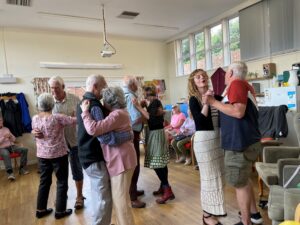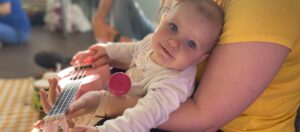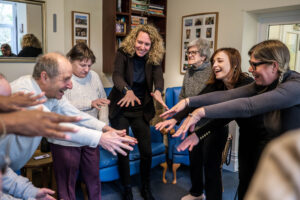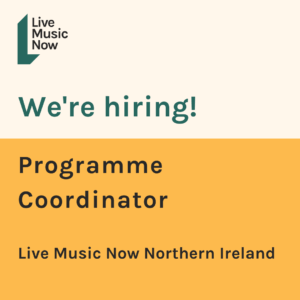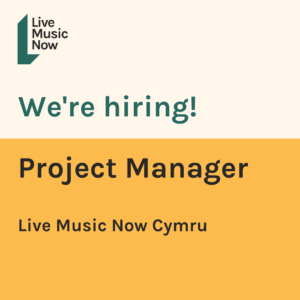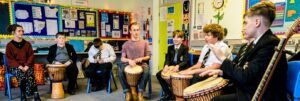"There is real potential at the moment for musicians to create their own career out of genuinely creative projects working with vulnerable people, and I think that’s a very encouraging sign for the future."
LMN musician Tom Sherman has been working with our North East branch for many years. He has performed in a whopping 255 participatory concerts with his ensemble Three Jazz and as a musician-in-residence 106 times. As he approaches his last year on the scheme, Helen Mahoney, North East Branch Director, speaks with him about his work with Live Music Now so far.
 How did you first hear about LMN, and what made you want to work with us?
How did you first hear about LMN, and what made you want to work with us?
I attended an LMN presentation whilst in my third year at Leeds College of Music. I had heard about it because one of my more resourceful housemates was making a little money distributing flyers for the event! It seemed like genuinely interesting and rewarding work, so I decided to audition with my Trio.
You joined LMN as part of trio ‘Three Jazz’. What were your first experiences of working for LMN like?
For our first few performances we played in a special school and a day centre for adults with learning disabilities, mentored by Lenny Sayers. We were one of the only ensembles in Yorkshire at the time so we ended up doing a lot of work quite quickly after we joined, we learned a lot and had a fantastic time. Playing a tour of 10 special schools and day centres for adults with learning disabilities in 5 days was a great experience, something we did a couple of times. Exhausting though- we’d all be fast asleep by about 8pm each evening!
You’ve recently led a residency project at Welburn Hall School. How do you feel the pupils there benefitted from your visits?
Yes, I’ve just finished my second residency at Welburn Hall. Residency models are rewarding because you can see how pupils’ musical skills develop throughout a project, and I think they all benefit hugely from regular music sessions. Clearly everybody that is involved with LMN is aware of the importance music has for children in special education, and the first hand experiences I’ve had have opened my eyes to what music can be. It is a form of universal communication that can enliven and animate us in a profound way, and it’s a great creative challenge to design activities that can harness those attributes to engender positive reactions in a group of young people.
You’re currently taking on a mentoring role on our Youth Music funded project working with schools for young people with social, emotional and behavioural difficulties. How do you feel about passing on your skills and knowledge to other musicians?
I feel that mentoring is less about passing on skills and knowledge, and more about guiding musicians as they are learning for themselves. There is no right or wrong way of doing things, but there are ways of learning to recognise what is effective. Each musician must develop their own style of presentation and be able to create their own musical activities, so that by the end of the project they have the skills and confidence to deliver a residency on their own.
What has been your favourite moment of your LMN career so far?
There have been many memorable moments- playing at King’s Place for LMN’s 35th anniversary concert; delivering a residency for the first time within a specialised prison unit; most of all seeing the faces of hundreds of young people light up when they experience live music.
Here's a clip of Tom performing at an All Together Now event for families with children with special needs in Birmingham
Tom Sherman from Live Music Now on Vimeo.
Why is it important for professional musicians to visit special schools?
Professional musicians should be able to deliver a level of performance that will enchant, enliven and animate their audience; those kinds of performances can be of huge benefit to children with special needs.
How has LMN influenced your own professional development?
After joining LMN just after I graduated from music college, I developed a real passion and fascination for working with people using music. For me the appeal is in the creative challenge of making music accessible to a wide range of people. From gaining those first valuable experiences at LMN, I now work for seven different charities that focus on using music with vulnerable people. I train other musicians on how to work in specialist environments, and I’m also involved in several projects training teachers how to use music in special schools. I’ve spoken at international conferences about my work on the Medical Notes project at Manchester Children’s Hospital and I’ve been privileged enough to work in some very specialist environments including intensive care units, prisons, and secure units for children with mental health problems. There is real potential at the moment for musicians to create their own career out of genuinely creative projects working with vulnerable people, and I think that’s a very encouraging sign for the future.
What would you tell a musician thinking of auditioning for LMN about your experiences and opportunities as an LMN artist?
If you want to do something genuinely interesting and creative with music, and you enjoy working with people, then you will probably love working for LMN. If you just see it as another gig, then it’s not for you.
